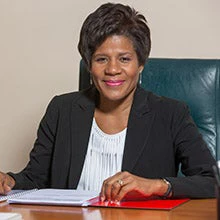 تتبادر إلى ذهني العديد من المشروعات الرائدة والمبادرات الناجحة.
تتبادر إلى ذهني العديد من المشروعات الرائدة والمبادرات الناجحة.
As I look back at the four years I spent in the Maghreb and Malta as Country Director, I would like to share some reflections on my work there with the World Bank.
After a fascinating and enriching experience in Sub-Saharan Africa, whether in Chad, Cameroon, DRC or Nigeria, I knew I was moving to a whole new experience in the Maghreb. The region is often viewed as homogeneous, sharing a common language, religion and culture. Little did I know how much of these "perceived commonalities" were to be inaccurate. The Maghreb is composed of a diverse set of contexts and the countries have different development needs and trajectories. When I took up my duties four years ago, Tunisia was heading down the path to political transition after years of instability following the 2011 Revolution. Algeria was slowly moving away from an oil-based economy, Morocco was consistently rolling out its 2011 Constitutional reforms and Libya's future remained unclear. Malta, one of the best performing EU countries was seeking to maintain ties with the Maghreb countries and the World Bank was offering a convenient platform for this.
Many flagship projects and successful initiatives come to my mind. In Morocco, we delivered a set of structural operations tackling the country's green growth agenda, strengthening its governance framework, upgrading the agricultural sector, developing an urban model to set an example of successful municipal management, putting in place disaster risk management systems and building foundational blocks to modernize the social protection system with the setting up of a social registry that could more than double the volume of social assistance reaching the poorest quintile. I leave the country pleased to have been able to deliver a new Country Partnership Framework which sets an ambitious roadmap for the next six years, in line with the vision of "relevance and impact" that I have long struggled for.
In Algeria, as the economic and political context is changing, I feel that we have been moving in the right direction. These past few years, by providing Advisory services, we have strengthened our partnership around the country’s goals to achieve economic and social transformation and stimulate inclusive growth and job creation by investing in human capital, infrastructure and new technologies.
In Tunisia, I have been impressed by the degree of resilience and political awareness of the Tunisian people. The country's various constituencies were able to demonstrate over the years their maturity and ambition to make the Jasmine Revolution a success. My commitment was to support the government of Tunisia in stabilizing the country's macro-economic framework, lifting barriers for open competition to unleash the potential of the private sector and hence boost job creation. Throughout my tenure, I was able to position the World Bank as a "supporter" to sensible and well-designed solutions developed consensually by the various constituencies.
In Libya, despite a volatile security and political context, we managed to deliver technical assistance to strengthen statistical capacities and ensure that Libya's development data continue to be collected to track gaps and development needs. We also established the Libya economic dialogue, a platform to discuss the country’s priorities with a diverse group representing all strands of society. This allowed us to build a new engagement strategy which sets forth the contours of the Bank's support to Libya for the next three years.
In Malta, we helped the Government organize a “5+5” high-level dialogue on how to boost investment in North Africa with the Five countries on both sides of the Mediterranean during the ECOFIN when Malta assumed the chairmanship of the European Union in 2017. We also assisted in the review of some of their policies such as Doing Business or social protection. All-in-all a strong partnership.
One of the Maghreb's key assets is its talented, vibrant and innovative youth. Examples showing their creativity and innovation flourish: Morocco, for example, launched a national digital payment platform, and young entrepreneurs in Algeria are inventing new ways of participating in supply chains through open innovation. To integrate these initiatives into a dynamic entrepreneurship ecosystem, the region launched the Maghreb Startup Network, a platform of exchange that aims to build more business opportunities, streamline the legal framework for startups, and improve payment systems to help the Maghreb youth fulfill their economic potential. I am pleased with my engagement in this initiative. Across the region, youth empowerment has been my leitmotiv and truly one of the bright spots of my tenure. Their drive and ambitions inspired me in so many ways and have nurtured my motivation to do more for youth in the region and beyond.
As I am heading South to become Country Director for South Africa, Namibia, Lesotho, Botswana and Eswatini, I am taking with me the greatest memories of a vibrant and dynamic region with so much potential and resources and I am sure there will be many opportunities for south-south collaboration between Southern Africa and the Maghreb. I would like to sincerely thank all the colleagues, government officials, civil society members, private sector players, friends and people of the Maghreb for such a rewarding experience at both personal and professional levels.
Ma'a assalama for now and until our paths cross...



Join the Conversation